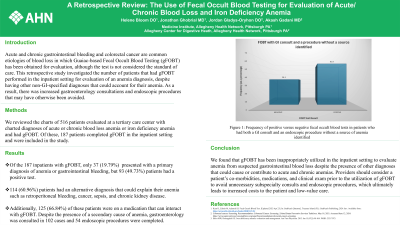Tuesday Poster Session
Category: GI Bleeding
P4165 - A Retrospective Review: The Use of Fecal Occult Blood Testing for Evaluation of Acute/Chronic Blood Loss and Iron Deficiency Anemia Despite Secondary Diagnoses
Tuesday, October 29, 2024
10:30 AM - 4:00 PM ET
Location: Exhibit Hall E

Has Audio

Helene Bloom, DO
Allegheny Health Network
Pittsburgh, PA
Presenting Author(s)
Helene Bloom, DO1, Jordan Gladys-Oryhon, DO1, Jonathan Ghobrial, MD2, Akash Gadani, MD3
1Allegheny Health Network, Pittsburgh, PA; 2Allegheny Health Network Medicine Institute, Pittsburgh, PA; 3Allegheny General Hospital, Pittsburgh, PA
Introduction: Acute and chronic gastrointestinal bleeding and colorectal cancer are common etiologies of blood loss in which Guiac-based Fecal Occult Blood Testing (gFOBT) has been obtained for evaluation, although not considered the standard of care. This retrospective study investigated the number of patients that had gFOBT performed in the inpatient setting for evaluation of an anemia diagnosis, despite having other non-GI-specified diagnoses that could account for their anemia. As a result, there was increased Gastroenterology consultations and endoscopic procedures that may have otherwise been avoided.
Methods: We reviewed the charts of 516 patients evaluated at a tertiary care center with charted diagnoses of acute or chronic blood loss anemia or iron deficiency anemia and had gFOBT. Of these, 187 patients completed gFOBT in the inpatient setting and were included in the study.
Results: Of the 187 inpatients with gFOBT, only 37 (19.79%) presented with a primary diagnosis of anemia or gastrointestinal bleeding, but 93 (49.73%) patients had a positive test. 114 (60.96%) patients had an alternative diagnosis that could explain their anemia such as retroperitoneal bleeding, cancer, sepsis, and chronic kidney disease. Additionally, 125 (66.84%) of these patients were on a medication that can interact with gFOBT. Despite the presence of a secondary cause of anemia, Gastroenterology was consulted in 102 cases and 54 endoscopic procedures were completed.
Discussion: We found that gFOBT has been inappropriately utilized in the inpatient setting to evaluate anemia from suspected gastrointestinal blood loss despite the presence of other diagnoses that could cause or contribute to acute and chronic anemias. Providers should consider a patient’s co-morbidities, medications and clinical exam prior to the utilization of gFOBT to avoid unnecessary subspecialty consults and endoscopic procedures, which ultimately leads to increased costs to the patient and low-value care.
Disclosures:
Helene Bloom, DO1, Jordan Gladys-Oryhon, DO1, Jonathan Ghobrial, MD2, Akash Gadani, MD3. P4165 - A Retrospective Review: The Use of Fecal Occult Blood Testing for Evaluation of Acute/Chronic Blood Loss and Iron Deficiency Anemia Despite Secondary Diagnoses, ACG 2024 Annual Scientific Meeting Abstracts. Philadelphia, PA: American College of Gastroenterology.
1Allegheny Health Network, Pittsburgh, PA; 2Allegheny Health Network Medicine Institute, Pittsburgh, PA; 3Allegheny General Hospital, Pittsburgh, PA
Introduction: Acute and chronic gastrointestinal bleeding and colorectal cancer are common etiologies of blood loss in which Guiac-based Fecal Occult Blood Testing (gFOBT) has been obtained for evaluation, although not considered the standard of care. This retrospective study investigated the number of patients that had gFOBT performed in the inpatient setting for evaluation of an anemia diagnosis, despite having other non-GI-specified diagnoses that could account for their anemia. As a result, there was increased Gastroenterology consultations and endoscopic procedures that may have otherwise been avoided.
Methods: We reviewed the charts of 516 patients evaluated at a tertiary care center with charted diagnoses of acute or chronic blood loss anemia or iron deficiency anemia and had gFOBT. Of these, 187 patients completed gFOBT in the inpatient setting and were included in the study.
Results: Of the 187 inpatients with gFOBT, only 37 (19.79%) presented with a primary diagnosis of anemia or gastrointestinal bleeding, but 93 (49.73%) patients had a positive test. 114 (60.96%) patients had an alternative diagnosis that could explain their anemia such as retroperitoneal bleeding, cancer, sepsis, and chronic kidney disease. Additionally, 125 (66.84%) of these patients were on a medication that can interact with gFOBT. Despite the presence of a secondary cause of anemia, Gastroenterology was consulted in 102 cases and 54 endoscopic procedures were completed.
Discussion: We found that gFOBT has been inappropriately utilized in the inpatient setting to evaluate anemia from suspected gastrointestinal blood loss despite the presence of other diagnoses that could cause or contribute to acute and chronic anemias. Providers should consider a patient’s co-morbidities, medications and clinical exam prior to the utilization of gFOBT to avoid unnecessary subspecialty consults and endoscopic procedures, which ultimately leads to increased costs to the patient and low-value care.
Disclosures:
Helene Bloom indicated no relevant financial relationships.
Jordan Gladys-Oryhon indicated no relevant financial relationships.
Jonathan Ghobrial indicated no relevant financial relationships.
Akash Gadani: Phathom Pharmaceuticals – Speakers Bureau.
Helene Bloom, DO1, Jordan Gladys-Oryhon, DO1, Jonathan Ghobrial, MD2, Akash Gadani, MD3. P4165 - A Retrospective Review: The Use of Fecal Occult Blood Testing for Evaluation of Acute/Chronic Blood Loss and Iron Deficiency Anemia Despite Secondary Diagnoses, ACG 2024 Annual Scientific Meeting Abstracts. Philadelphia, PA: American College of Gastroenterology.
